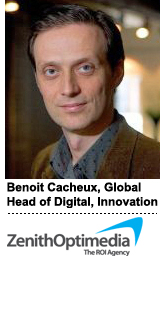 Publicis-owned agency Zenith had many high-profile exits in the last year, like Julian Zilberbrand moving to Viacom and John Nitti going to Verizon, but the agency is doubling down on recruitment.
Publicis-owned agency Zenith had many high-profile exits in the last year, like Julian Zilberbrand moving to Viacom and John Nitti going to Verizon, but the agency is doubling down on recruitment.
Increasing competition from systems integrators and consultants like Deloitte and Accenture have forced Zenith to rethink its talent requirements.
“We’re recruiting people who can be more consultative,” said Benoit Cacheux, the global head of digital and innovation for Zenith. “We’re not just trying to drive media impact, but business and brand value.”
But Zenith also has to meet new operational demands from parent holding company Publicis Groupe, which consolidated six global agencies last spring into four: Starcom, Zenith, Mediavest/Spark and Optimedia/Blue 449.
Cacheux spoke with AdExchanger about some of these shifts.
AdExchanger: How is Zenith different since the reorg? What’s your main priority now?
BENOIT CACHEUX: At a global level, we try to set a lot of guidelines and rules around digital [planning]. The activation gets done at the local level. We’ve developed an approach where we want clients to think of us as a company that will help them innovate. And that’s not just from a media innovation perspective, but potentially looking at products and creating layers of services on top of it. We’re recruiting for people who can help us do that.
How did the reorg change your approach?
We’re trying to look at the overall value chain for clients and be more consultative in our approach. We obviously do a lot of media planning and buying and that’s our core business, but we’re evolving into consumer experience planning. In a lot of the projects we do for clients, we try to understand the journey across all touch points. Paid media will be one part of that, but when we do our modeling we look at the impact of owned, earned media and how it attracts sales and impacts brand metrics. It adds more value for the client, and on the back end you hopefully generate more business for the agency.
Does measuring sales require you to do more data management than in the past?
We’re coming from a traditional media background, but we’re [to become a] full consumer-planning agency that thinks about top-line growth for our clients. Some of our competitors don’t necessarily have all that data or try to get it all from their clients, but we’ll have a lot of digital data that will be more difficult for [competitors] to access. We have a sense of what works and what doesn’t work in [digital channels] and I think for the consultancies it’s a bit harder to do that.
What are your thoughts on walled gardens? Bad, good or neutral?
I’m optimistic by nature, so I hope companies like Facebook and Amazon want to be more open. Being pragmatic, they’ve built marketing environments where, as a consumer, you are logged in 24/7. And that [authentication] is valuable.
What gives us confidence is seeing companies like Facebook that are slowly opening up, where you’ve got Moat coming in and doing some desktop verification. I hope we can have a stronger collaborative approach with the walled gardens, because we have clients with specific needs. If you try to model data across different sources and you’re missing data from Facebook or Amazon, it’ll be [a bigger problem long-term] when clients shift more budgets into digital.
What about gaps in TV measurement, particularly with growth in over-the-top and set-top box viewing?
A lot of the broadcasters offer bundled package access to online video, but they’re being quite slow about adopting programmatic. So even though it’s within a premium environment, in some cases you have very limited targeting capabilities. I’m sure it’s something most of them are conscious of, but because they come from a relatively traditional background, they’re taking longer to accept the changes that are happening and devaluing their inventory.
A lot of our big clients [still buy on this] TV model, but they are questioning it because when we look at the latest numbers, we see TV audiences are still declining, while the volume of overall video content being consumed is going up.
Interview edited for clarity and length.











